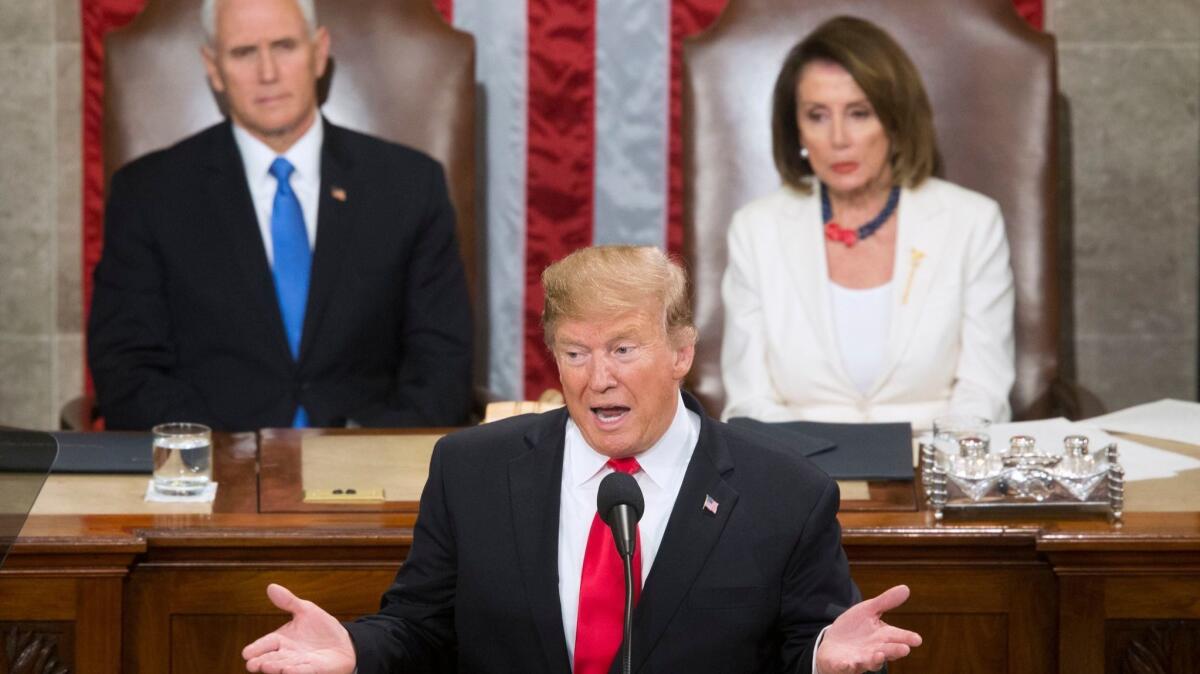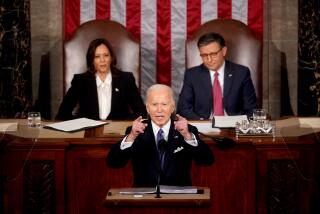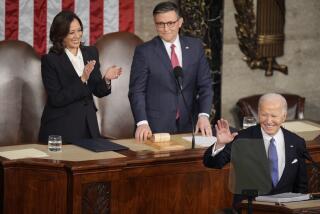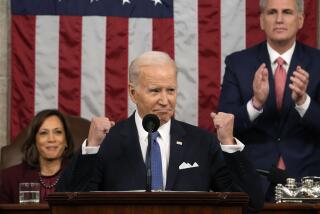Op-Ed: Watch out when Trump’s impeachment slams into his State of the Union speech

A State of the Union address is among the few remaining civic rituals. Its purpose is outlined in the Constitution, and millions still tune in to watch. An impeachment trial, too, is a civic ritual. Like the big speech, it’s also in the Constitution.
Now the State of the Union, planned for next Tuesday, and impeachment could collide. Both sides seem to be nervously gaming the schedule with that question in mind. If John Bolton is called as a witness, President Trump’s speech will be held in the middle of the trial. Or it will come just days after the Senate votes to quickly acquit.
I was Bill Clinton’s chief speechwriter in 1999, when he gave the address in the middle of his own impeachment trial. Clinton was wildly popular, and impeachment widely disliked. The senators had to adjourn the proceedings, trudge over to the House chamber, and listen to Clinton give a soaring, ebullient speech. That year, the State of the Union was … weird.
Trump is not likely to glide above the proceedings. If he is still on trial, with Speaker Nancy Pelosi sitting behind him and Rep. Adam B. Schiff in the audience, can he restrain himself and avoid denouncing the proceedings and his political foes? Alternately, can he refrain from a victory dance in the end zone, gloating about his acquittal?
Either way, the prime-time venue offers dangerous temptations for a narcissistic president. He’s already broken sharply with how his predecessors speak to the country. The bully pulpit is part of the majesty of the office, and a tool of political power, too. Presidents typically crave the chance to use it to lift and unite. More than we’ve recognized, Trump’s bombast has extended to the presidency’s big set-piece speeches, too.
There is a method to his madness — the ugly insults in the form of Homeric epithets, the lies, the veiled threats, the mob boss talk, the strongman roars. He seems to communicate exactly the message he wants to get across, whether it’s to his “enemies” or to the “very good people” who support him. There have been populist demagogues before from the left (Huey Long) and the right (Joe McCarthy, George Wallace). None stood behind the presidential seal.
In his inaugural address, for example, unlike all of his predecessors, Trump did not evoke the documents, deeds or ideals of the founders — which serve as inspiration and guide for new presidents. “Liberty” and “democracy” did not appear. Nor did “the Constitution.” No “all men are created equal.”
He has brought his WWE approach to the State of the Union too. That’s been most evident in a rather overdone aspect of the speech — the salute to heroes in the gallery, who typically sit with the first lady.
Ronald Reagan debuted this feature in 1982. He lauded Lenny Skutnik, a federal worker who bravely dived into the Potomac River to rescue a passenger after a plane crash. Reagan’s overarching message: America is a nation of heroic individuals.
Bill Clinton’s heroes had a different focus, more communitarian, often government employees doing their job. His message: We’re all in it together.
Trump has focused repeatedly on a handful of victims of crime committed by undocumented immigrants. They represent a tiny fraction of the public. We all feel for their loss, but Trump’s meta-message, too, is dismayingly clear: Brown people are coming to kill you.
Last year, Trump had just signed bipartisan criminal justice reform, and pointed out individuals whose prison sentences had been shortened by the First Step Act. Don’t expect him to strike a similar note.
This year’s speech, after all, comes at the start of a campaign year. Trump will no doubt tout good economic news and bipartisan support for the Canada-Mexico trade deal. But he’s not likely to campaign for reelection as the leader of all Americans. Rather, he’s intensifying his bullying language, stirring up his supporters. His attorney general has denounced “militant secularists.” Earlier this month, a White House aide prayed for miscarriages of “satanic pregnancies.” There are reports that he plans to expand his ban on travelers from Muslim countries. And so on.
Trump has spurned the unifying, patriotic language typically used by presidents as a balm for social division. Corny, sometimes insincere, that language has served an important national purpose. Trump has, instead, replaced it with rhetoric extolling blood and soil, a backwards notion of nationalism that divides an ever more diverse nation. If he does so again this year, it will be one more American institution eroded in this very unusual presidency.
Michael Waldman, president of the Brennan Center for Justice at the New York University School of Law, was director of speechwriting for President Clinton. He is the author of “My Fellow Americans: The Most Important Speeches of America’s Presidents from George Washington to Barack Obama.”
More to Read
A cure for the common opinion
Get thought-provoking perspectives with our weekly newsletter.
You may occasionally receive promotional content from the Los Angeles Times.






